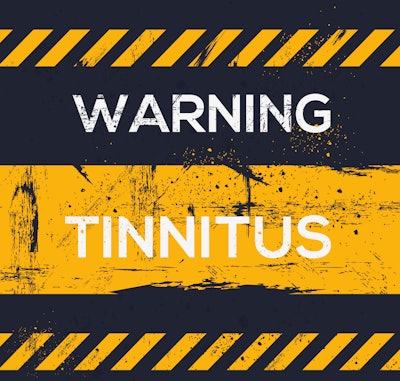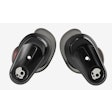Hope Zvara, Mother Trucker Yoga
That constant annoying ringing, no, it's not a buzzer on your truck, no, it's not an alarm on your phone. It's coming from inside your ears.
Tinnitus can be described as a ringing in the ears, but it can also sound like clicking, hissing, roaring, or buzzing. You quickly notice tinnitus when there is no external noise present, such as at bedtime.
As a young adult, I would notice a ringing in my ears but never thought much of it, the ringing would come and go, and I never heard anyone else speak of it, so I thought it was normal.

Tinnitus is not a disease. You can't catch it, you don't come down with it, and most don't get rid of it but rather learn to manage it. Tinnitus is a symptom, a sign that something is wrong with your auditory system. Your auditory system includes your ear, the nerve that connects the inner ear to the brain, and parts of the brain that process sound. When this pathway is altered or damaged in any way, it can cause tinnitus.
Many people who have tinnitus may not even notice it, or it comes and goes so that they cannot pinpoint that it is tinnitus, and it never really affects their everyday life. But for other people with severe tinnitus may have problems hearing, working, or sleeping. Tinnitus can alter a person's mood, outlook, health, and happiness when not managed properly.
There is no cure for tinnitus, and when I heard this, I was devastated. It took me more than two years to recover from my concussion and even though my vision was affected, leaving me tied to my glasses more than ever, what began to weigh on me was the constant ringing in my ears and the notion that it may never go away.
It's like when you buy a new vehicle, and it's white, and then you notice every other white vehicle on the road too, but before that, you never really paid attention. That is tinnitus, now more than ever, I would find myself listening to find the ringing, "Was it still there"? "Oops, what about now"? "Still"?
The causes for tinnitus are vast and can include:
- Hearing loss
- Ear blockage or damage
- Earache
- Head or neck injury
- Medications: nonsteroidal anti-inflammatory drugs (NSAIDs) and certain antibiotics, cancer drugs, water pills (diuretics), antimalarial drugs, and antidepressants.
- Meniere's disease
- TMJ
- And other chronic disorders: diabetes, thyroid problems, migraines, anemia, and autoimmune conditions such as rheumatoid arthritis and lupus.
Strategies for Reducing the Effects of Tinnitus
- Hearing aids. Because some people develop tinnitus due to hearing loss, when you use a hearing aid, you can turn the volume of external noise up and, in turn, reduce the sounds of internal noise.
- Sound machines. Parents will often buy these for their newborn baby to help them sleep, but they might help you too. A sound machine can help you shift your attention away from the ringing and towards another sound. And the great thing is there are plenty of apps you can download and have one right on your phone; using this device may help you shift your attention away from the ringing when you are trying to fall asleep.
- Behavioral therapy. This can involve you attending therapy once a week, focusing on coping strategies for tinnitus, and talking through negative thought patterns. This type of treatment can be helpful for people who find living with tinnitus to be affecting their life in a way that has a negative impact. While it may be challenging for you as a driver to attend therapy sessions physically, many health care providers now offer online therapy sessions that you can do from your computer. But if that is not possible, consider confiding in a friend or family member, someone who is good at listening. Or connect with a group of people who also suffer from tinnitus to gain support. Just talking about a problem can lift the heavy burden of living with it and suffering in silence.
- Meditation, yoga, and mindfulness practices. This may seem contradictory since the quiet makes the ringing more noticeable. However, I experienced firsthand the benefit of these practices to help me improve the quality of my life and manage tinnitus more effectively. All of these practices help you learn how to shift your attention away from one thing and onto another. At night I listen to meditations and focus on my breathing to help my mind focus on the ringing less. And I try to pick music that improves brain waves and promotes relaxation like nature sounds, Alpha Waves or Beta Waves. Meditation improved my sleep quality and overall happiness because I am no longer dwelling and obsessing on the ringing; in a way, I have come to peace with it.
- Regular exercise. When you get out and get moving, you improve your overall well-being. Tinnitus can be aggravated by stress, depression, anxiety, lack of sleep, and illness. Regular exercise will help you manage stress, sleep better, and stay healthier.
- Watch your diet. Reducing your intake of foods containing high amounts of sodium, caffeine, sugar, or citrus may help reduce your tinnitus symptoms. Also, be mindful that highly processed foods containing unhealthy fats and alcohol may also trigger symptoms. These foods can raise your blood pressure and blood sugar levels, which can cause tinnitus symptoms.
- Herbal and vitamin supplements. Although there isn't enough research by western medicine standards, many swear that taking supplements like zinc, ginkgo, and vitamin B-12 has helped manage symptoms and provide some relief.
- Holistic practices and therapies. Modalities like acupressure, acupuncture, craniosacral therapy or massage even hypnosis may help you manage tinnitus and its symptoms.
Louise Hay, author of You Can Heal Your Life, notes in her book that tinnitus is a symptom of refusing to listen, not hearing the inner voice, and stubbornness. She discusses in all of her books how physical symptoms are the bubbling up of unresolved internal issues. And considering 85 to 90% of all disease has physiological and or emotional ties, I'd say she might be onto something. Plus by being aware of the connection can make it easier to find the relationships. I may have suffered from a concussion, but there is most definitely truth in her teaching for me and others.
If you suffer from tinnitus, then the goal should be to develop techniques to help you lessen the perceived sound and intensity and learn to turn the volume down and notice it less.
I believe that there is no one-size-fits-all, and if you have tried one of the above with little success, do not be discouraged; try another, or better yet, go back and try it a second, even a fifth time.
It can be overwhelming receiving a diagnosis about your health that you didn't see coming. But that doesn't mean there isn't hope or help. In all things in life, you have a choice, to keep on the path you are on or step off and try something new.
Spending your time focusing on the ringing can lead you down a path of depression, anxiety. Learning to shift your mindset about your tinnitus from something you will never get rid of to learn how to come to peace with it, manage the symptoms and even find some relief is the approach that will help you move forward and continue to live a great life.
We all get thrown curveballs in life.
We all get dealt a hand of cards we didn't ask for.
We all get overwhelmed or find ourselves sad and even depressed at times.
That is normal, but it's what you do after that counts. I have come to terms with the fact that I will live with tinnitus for the rest of my life. But I have also made an effort to do all I can to reduce the symptoms, shift my attention away from the ringing onto other things, and work to keep in perspective that everyone has something. Everyone has something they are dealing with; for me, it's tinnitus. For another, it may be cancer, or Parkinson's', or a nerve disorder. Whatever it is, we all have something, and with a perspective like that, we can have compassion for others and ourselves.










